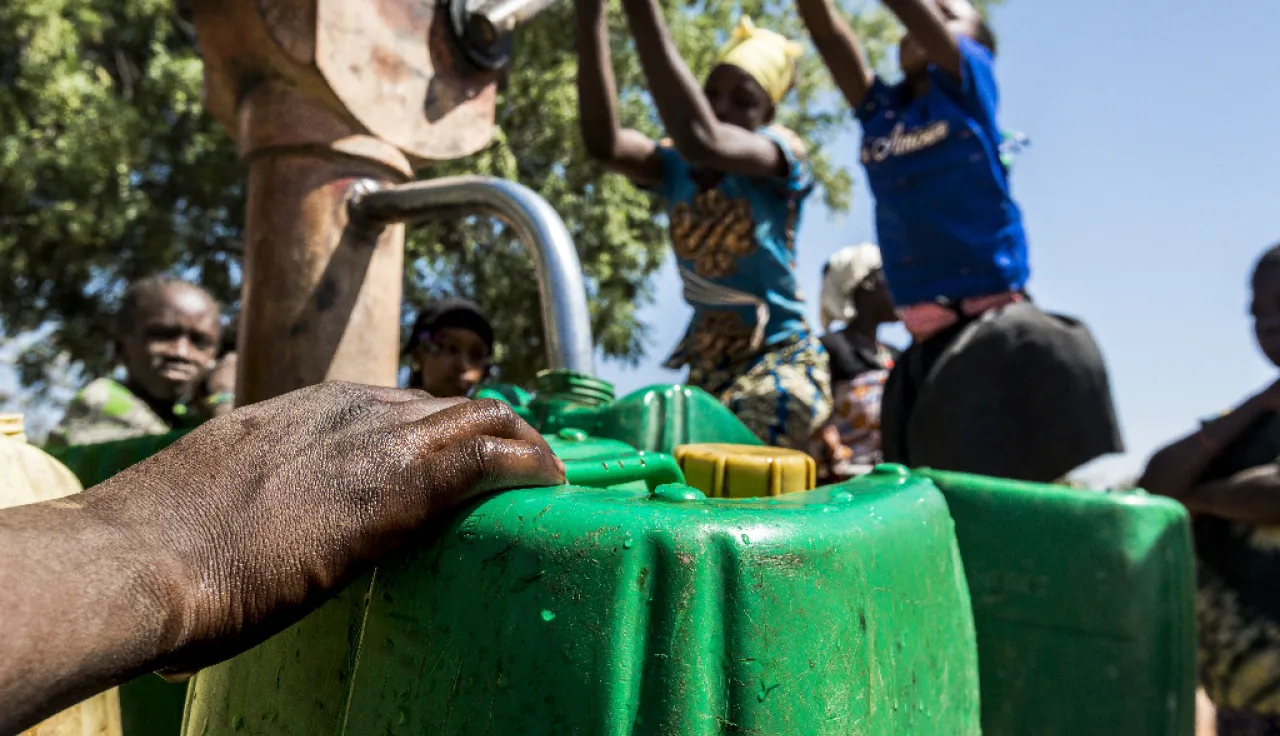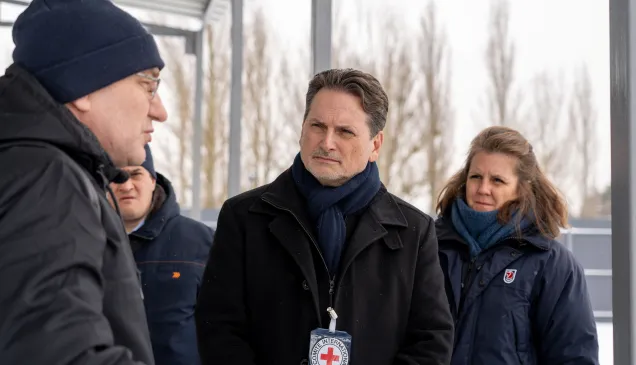"With more conflicts and urban warfare around the world, access to water is now one of the main humanitarian issues and is being exacerbated by the impact of climate change. We need to innovate and develop new partnerships to respond," said Gilles Carbonnier, vice-president of the International Committee of the Red Cross (ICRC) at the ninth World Water Forum in Dakar.
In addition to struggling with the consequences of armed violence, affected people suffer as essential services deteriorate. For instance, more than ten years of conflict in Syria has seriously damaged the water-supply network, reducing supply by between 30 and 40 per cent. In the Sahel, climate change – which is partly behind the increasing scarcity of water – has made living conditions even tougher for millions of people caught up in conflict.
Water crisis in towns and cities
The trend towards urban warfare is stark, as we see in Ukraine. In Mariupol and other cities, people are trapped by heavy combat and are sheltering in unheated basements. With no running water, some have turned to melting snow or to using the water from radiators.
When war moves into urban areas, the risk that critical civilian infrastructure will be damaged or destroyed increases dramatically, in particular when explosive weapons with a wide impact area are used. Whether such infrastructure is damaged or destroyed intentionally or unintentionally, the ICRC untiringly reminds parties to a conflict to avoid the use of such weapons in populated areas on account of the high probability of causing indiscriminate harm or damage, which is prohibited under international humanitarian law (IHL).
Restricting access to water, threatening civilians
In some countries, parties to a conflict take control of water and agricultural resources. Restricting access to water as a tactic of war – or damaging facilities that supply water, treat wastewater or provide electricity – has a negative impact both immediately and in the long term on the health of already very vulnerable people. The lack of drinking water is one of the major causes of forced displacement.
Must we remind people that IHL prohibits indiscriminate attacks and attacks that target civilian objects, including the natural environment? Whatever the belligerents' purported motive, attacking, destroying, removing or rendering useless "objects indispensable to the survival of the civilian population" is never justified and remains a grave breach of IHL.
The burden of climate change
Of the 25 countries deemed most vulnerable and least ready to adapt to climate change, 14 are embroiled in conflict.
Although in our experience access to water is never the direct cause of an armed conflict, the absence of institutions or mechanisms capable of mediating between conflicting interests and managing water resources fairly can help shape the dynamic of violence and profoundly change the social fabric.
In the Sahel, the deterioration and scarcity of resources, exacerbated by climate change, has sparked tensions between communities over access to water and arable and pastureland. In fact, pastureland is shrinking at an alarming rate as a result of climbing temperatures and weaker rainfall. In addition, the presence of many armed groups has made using transhumance corridors more difficult.
Naturally, the weakness, if not the total absence, of public investment in essential infrastructure helps to maintain the flagrant disparities and dangerous tensions that exist between communities. To calm or even forestall these tensions, how water is treated and distributed in countries heavily affected by both climate change and armed conflict must be regarded as a priority.
Protect the natural environment at all times
The issue of access to water is a central concern of the ICRC's. The number of people in need and the sense of emergency is palpable: between now and 2050, global demand for water is expected to rise by 30 per cent.
In 2021, we helped meet the urgent water needs of 37 million people by supporting the bodies responsible for water and sanitation in areas affected by protracted conflict and the effects of climate change.
It is clear that only humanitarian organizations have the capacity to meet the needs of the ever-growing numbers of people who require help. Faced with the crucial issue of the water crisis in areas affected by conflict, the ICRC makes three requests of states and the international community:
- Respect international humanitarian law. Armed conflicts often harm the natural environment, including the water resources on which populations depend for their survival. IHL protects the natural environment, including water sources, by virtue of its civilian character and protects objects indispensable to the survival of the civilian population, such as water treatment plants.
Respect for IHL may also limit the impact of armed conflicts on the natural environment and reduce the risks to which affected communities are exposed, in particular with regard to access to water. - Prioritize and support effective partnerships between sectors to ensure that water-supply networks remain resilient in the face of conflicts and other challenges, including climate change. Governments, local authorities, international financial institutions, the private sector and the humanitarian and development communities must work together to strengthen the resilience of these essential networks and their service providers in times of crisis.
- Strengthen climate action and finance in fragile states and countries affected by conflict. Despite the reduced resilience and the disproportionate impact on communities in countries affected by conflict, climate action has been weak because of the difficulties of working in fragile environments. States and international actors must ramp up their support for adaptation and anticipatory action in fragile states, which would strengthen the resilience of local populations facing climate change.
Climate funds and bilateral donors must accept a certain level of risk to make up for the funding gap between conflict-affected and stable countries, and ensure that their funding reaches the most vulnerable communities in a country and the most isolated states involved in a conflict.
For more information, please contact:
Fiona Barnaby, Communication Coordinator, ICRC Dakar, tel: +221 77 529 71 45,
fibarnaby@icrc.org
Halimatou Amadou, Media Relations, ICRC Dakar, tel : +211 78 186 46 87,
hamadou@icrc.org
or visit our website: www.icrc.org
To preview and download the latest ICRC video footage in broadcast quality, go to
www.icrcvideonewsroom.org
To find out what the ICRC is doing to put an end to attacks on health workers and patients, go to
www.healthcareindanger.org
Follow the ICRC on facebook.com/icrc and twitter.com/icrc
Download the advocacy public briefing paper here
(Available in French)




